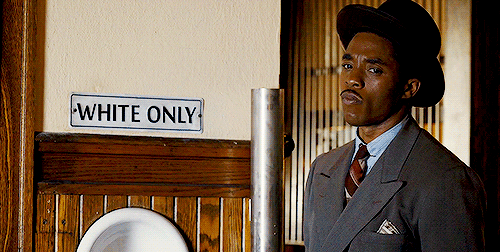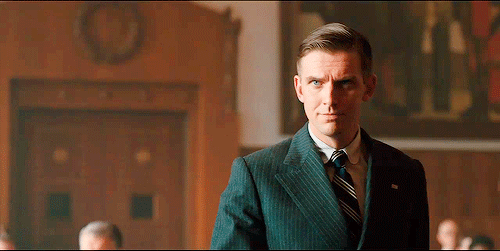While Brown v Board of Education will always be the landmark case associated with Supreme Court Justice Thurgood Marshall, he was a champion against injustice long before then. The new film Marshall is about one of his earlier cases, at a time when he was a young, fierce defense attorney for the NAACP, racing around the country defending blacks in cases where their race will surely get them convicted. Being essentially the only soldier in the field has built Marshall into a virtual boogeyman, his reputation proceeding him everywhere he goes. But it's also given him a big ego and a massive chip on his shoulder that others are dying to knock off.
The most interesting aspect of Reginald Hudlin's film is its depiction of Marshall as a flawed, hot-headed, but confident attorney who knows how to play the ins and outs of the race game. Chadwick Boseman, who has already played superheroes real (Jackie Robinson) and fictional (Black Panther), doesn't resemble Marshall physically in any way, but he's got the justice's intellect and swagger down pat. The film is a competent courtroom drama when it could have been extraordinary but for director Reginald Hudlin, best known for directing comedies like House Party and The Ladies Man. Through Hudlin what we get is the Remember the Titans of civil rights dramas, losing any teeth this pivotal early moment in Thurgood Marshall's career might have had.
The case Marshall takes on is Connecticut v. Joseph Spell (Sterling K. Brown), the latter a black man who accused of raping wealthy socialite Eleanor Sturbing (Kate Hudson), his employer. Spell was said to have attacked her, raped her, and threw her off a bridge into the river, where she managed to swim to safety. It's about as slam dunk a case as a prosecutor could ask for back then. An affluent white woman's word against those of a black man with a shady background and no firm alibi, tried by a district attorney who has his sights set on a political career. Marshall is paired up with white, Jewish insurance lawyer Sam Friedman (Josh Gad), who has never tried a criminal case. When the judge (James Cromwell) forbids Marshall to say anything during trial, forcing Friedman to argue the case, it's another sign of how high the deck has been stacked against them.
As a Jewish man in 1941 Connecticut, Friedman's main concern is keeping a good reputation. He has to live there long after Marshall has left, and trying a case most of the town has already made up their mind on won't be good for his practice. While Marshall's abrasive, insulting attitude causes friction between them, they soon find common ground in the mutual prejudices they must face. Screenwriters Michael and Jacob Koskoff, the former a civil rights attorney in his own right, put most of their attention in Marshall and Friedman's budding friendship in the midst of racial turmoil. But they don't depict just how much of a powder keg the Spell case would have been, nor the very real danger it would have placed both attorneys in just for defending him. Other than one act of violence, which is quickly glossed over, most of the trial comes across as a breeze. Spell, who swears his innocence but has a difficult time actually telling the truth, would have been a nightmarish client for anyone to handle. That would have gone double for Marshall who declares early on that he will only defend innocent clients, but he's fairly unwavering even when Spell is blatantly dishonest.
To dig further wouldn't necessarily fit with Hudlin's strength, though, and he gets the most mileage out of the mismatched dynamic between Marshall and Friedman. Given his background that shouldn't come as a surprise. It's just not what anyone would expect from a movie about Thurgood Marshall, but that isn't necessarily a bad thing. While those hoping for a more serious take on the material will be disappointed, Hudlin's approach is most easily accessible to the widest audience. They will undoubtedly come away satisfied, and if that means Thurgood Marshall becomes known to a new generation, then that's hardly something to complain about.
Rating: 3 out of 5
















